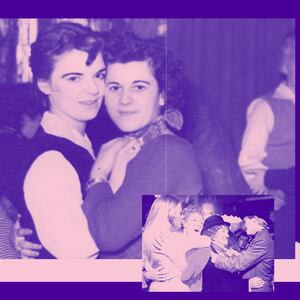When Jack Holden was 22, he volunteered at Switchboard, a much-cherished and valued LGBTQ+ information and support line in London. He had already landed his big break, starring in the West End production of War Horse, straight out of drama school. Suddenly, he was a young gay man smack in the heart of London. He wanted to meet people. “I wanted a community,” Holden said. “In some sense it was quite selfish, but I also did want to help.”
Ten years later, Holden is back on the West End, performing an acclaimed solo play inspired by one of the calls he received at Switchboard. Cruise, running at the Apollo Theatre for an encore engagement through Sept. 4, was the first West End production to open after COVID restrictions lifted there last spring.
“It was the biggest rush I’ve ever felt in my life,” Holden told The Daily Beast of that first return to the stage. The play’s exhilarating tour through 1980s Soho, a libertine sanctuary set upon by a plague, resonated with audiences emerging from pandemic isolation. It also landed Holden an Olivier nomination for Best Play.
ADVERTISEMENT
Founded in 1974, the then-named Gay Switchboard (and after that, London Lesbian and Gay Switchboard) was a leading source of information about HIV/AIDS in the 1980s, and still fields up to 20,000 calls per year. (Full disclosure: Tim Teeman, the editor of this piece, was a volunteer there from 2006 to 2010.)
Pre-internet, you might dial Switchboard for gay pub listings as for crisis support or a friendly ear. Volunteers receive rigorous training on how to handle all manner of situations on the line, Holden said. The one call that stuck with him long afterward, and has ultimately shaped the latest chapter of his career, lasted all of 15 minutes.

“It was the anniversary of his partner's death,” Holden said of the caller. “He was on his own and he wanted to reminisce. Everyone he knew already knew his story, so it was like he wanted someone new to tell,” Holden recalled. Any details that might identify the caller are withheld in the show, which is a collage of recollections Holden gathered from the era.
On stage Holden plays himself at 22, working the phones, as well as the caller (named Michael in the play) and some 30 other characters. Michael calls in and spins a magnetic tale—of meeting his partner, a beefy hunk with an ardor for karaoke, and falling quickly in love amid Soho’s hedonistic churn of electro beats and flashing lights. The record scratch arrives on schedule: Both lovers are diagnosed with HIV, and told they have four years to live at most and likely less.
“Rather than wallow in the misery of that, they decided to go out with a bang and make the most of what little time they thought they had left. His partner died a year or so later, and then he decided, ‘I'm going to party even harder,’” Holden recalled.

The caller’s story stuck with Holden because it was unlike those he had heard about the AIDS crisis, though he admits he had not been exposed to many prior to volunteering at Switchboard. The first he had learned of HIV/AIDS was just two years before, when a spokesperson from the Terrence Higgins Trust came to speak at his drama school, after he’d already been sexually active and had inherited the sense that being gay was dangerous but without any reasoning.
“In my mind, maybe naively, I thought at the time that people got HIV and they died. Or they dodged it and were lucky. But actually, there were plenty of guys who got it and by chance survived,” Holden said. “It struck me as very bittersweet that you could be given the gift of life again, but without anything to make it worth living.”
Cruise is about the inheritance of community history, a theme as evident in the story as in how it’s told. Embodying multiple characters in a single whirlwind performance, under the direction of Bronagh Lagan, Holden demonstrates how legacies flow from one generation to the next. “If you think about our identity, we are all bits we’ve picked up along the way,” Holden said, noting that the people we meet influence who we become.
That sense of interconnection is also reflected in the production’s propulsive original music, composed and performed by John Patrick Elliott, who collaborated closely with Holden from the play’s earliest stages. “So much of the music from the 80s was about sampling and borrowing riffs and putting them on top of a very basic electronic beat. We all borrow everything, and we steal and we plagiarize and we copy,” Holden said. Music in Cruise also delineates time and place, with the disco beats of Gloria Gaynor conjuring up the Kings Arms, and the first rumblings of Chicago house lighting up the legendary club Heaven.
Cruise marks Holden’s debut as a playwright and has been a remarkable success, with a film adaptation already in development. But Holden wasn’t sure at first if it was his story to tell, or one that hadn’t been heard enough already. It’s a Sin, Russell T. Davies’ BBC series about young Londoners careening headlong into the AIDS crisis, had just aired in the U.K. before the initial West End run of Cruise. “I felt a bit of shame about it, like is this actually serving our community or just telling the story of this time yet again?” Holden recalled.

“Then I thought, that’s such an internalized homophobia kind of scarcity mindset. There are a hundred detective dramas on every single night about fictionalized people getting murdered, and this was a huge part of our history,” Holden said. “This story is nowhere near being covered enough.” And while dramas about the AIDS crisis like Tony Kushner’s Angels in America and Matthew López’s The Inheritance have come from American playwrights, with their epicenter in New York, Holden recognized a lack of voices in British theater, and depictions of how the crisis unfolded there.
But the people whose stories are still missing from the stage do not look like Holden (or Kushner or López), namely Black and brown people, trans people, sex workers, and more who were severely impacted by HIV/AIDS in the 1980s, and continue to be disproportionaly affected today. “The gender identity or race of a lot of the characters are open to interpretation,” Holden said of Cruise. “But I also can’t deny that I’m a white man playing them. It’s a step on the way, and hopefully clearing the ground for more British perspectives from more marginalized voices.”
Concluding the return engagement of Cruise, Holden considers that he’s managed to do justice to the caller who inspired the play, and to the many others he’s come to represent. “I feel so much love and respect for the people of that generation and for what they went through,” Holden said. “By the time we finish this run, I feel will have done my duty to the community and to our gay elders, which feels good.”







